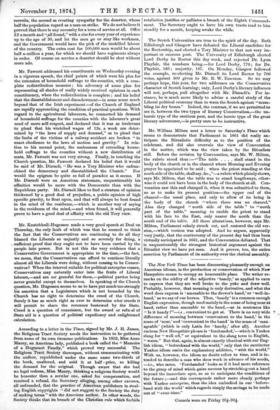The New York Times has been discoursing pleasantly enough on
American idioms, in the production or conservation of which New Hampshire seems to ciccupy an honourable place. The writer re- marks on the oddity of the adjective handy,' as applied to oxen to express that they are well broke to the yoke and draw well. Probably, however, that meaning is only derivative, and what the word does express is amenable to the drover's hand,' or well-in- hand,' as we say of our horses. Thus, ' handy ' is a common enough English expression, though used naainlyin the sense of being near at hand, rather than amenable to the hand,—as in sentences like "Is it handy ?"—i.e., convenient to get at. There is no very wide difference of meaning between 'convenient• to the hand,' in the sense of 'near,' and Iconvenient to the hand' in the sense of 'man. ageable ' (which is only Latin for handy,' after all). Another curious New Hampshire phrase is forehanded,'—which is Yankee slang for " well off," or equivalent to the slang term in English, "warm." But that, again, is almost exactly identical with our Eng- lish idiom, "beforehand with the world," only that the succincter Yankee idiom omits the explanatory addition, "with the world." With us, however, the idiom no doubt refers to time, and is in- tended to describe a man who does work in advance of his needs, —i.e., who saves. 'Forehanded' looks as if it had more reference to the grasp of mind which gains success by stretching out a hand beyond the immediate spot, so as to anticipate the conditions of the future ;—and this corresponds rather more closely perhaps with Yankee enterprise, than the idea embodied in our before- hand with the world' which regards simply the savings to be made out of "over-time."


































 Previous page
Previous page